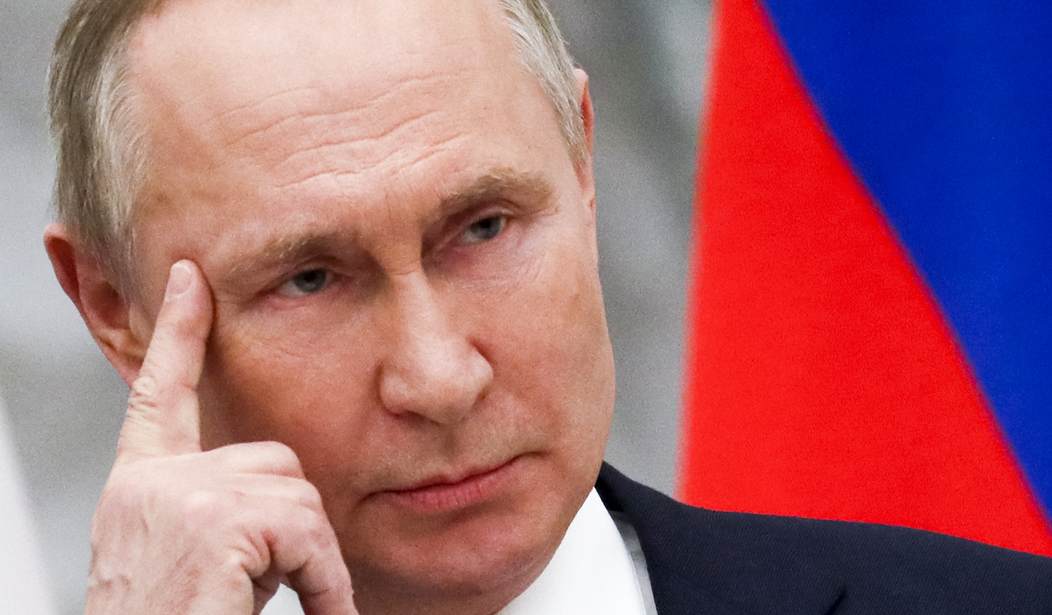The Russian economy is in “shock” over what the Kremlin calls “economic warfare” waged by the U.S. and the West… so what’s our excuse?
According to a new Reuters report, Kremlin spokesman Dmitry Peskov told reporters, “Our economy is experiencing a shock impact now and there are negative consequences, they will be minimized.”
Exactly how Moscow would minimize those negative consequences — with much of Russia’s trade and finance halted, sanctioned, or frozen — wasn’t specified.
“This is absolutely unprecedented,” Peskov said. “The economic war that has started against our country has never taken place before. So it is very hard to forecast anything.”
Bloomberg calls the pinch “a domestic toll that’s already comparable to the worst downturns of President Vladimir Putin’s more than two decades in power.”
“Russia is already headed for one of its biggest inflation spikes this century and the risk of shortages is prompting the government to impose restrictions on exports,” according to the report.
A Bank of Russia survey showed that analysts believe the Russian economy will shrink 8% or more in 2022, compared to a pre-Ukraine War consensus of 2.4% growth.
Underappreciated, perhaps, are all the unexpected ways sanctions crimp the Russian economy:
Sanctions imposed by the United States and the European Union mean that the world’s two major aircraft makers, Boeing and Airbus, are no longer able to supply spare parts or provide maintenance support for Russian airlines. The same is true of jet engine makers.
What that means is that Russian airlines could run out of spare parts “within a matter of weeks” or be forced to fly planes “without having equipment replaced as frequently as recommended to operate safely.”
The New York Times reported early Friday that while “China has tools” to help Russia weather the sanctions regime, “none are big enough to save it.”
The Beijing-Moscow Axis’ major financial problem is that hardly anyone trusts the stability of either the renminbi or the ruble. Even with China’s rapid rise and immense trading position, the dollar remains the world’s preferred global trading currency, particularly for oil.
Recommended: Trucker on Fuel Prices: ‘What Are Y’all Gonna Do Next Month When Your Gallon of Milk Costs $11?’
But for how much longer?
America’s current inflationary spiral, just like the Russian economy’s, seems to be just getting started. Inflation was up again in February at a 7.9% annual rate.
February was worse than January which was worse than December, yadda-yadda-yadda, going back to April. That’s right after Washington started printing money like James Patterson paperbacks.
Meanwhile, the federal money-printing machine went into overdrive again this week, with the passage of a $1.5 trillion spending bill, loaded with pork.
Senate Majority Leader Chuck Schumer (D-New York) called it “the strongest, boldest and most significant government funding package we’ve seen in a very long time.”
That’s exactly what’s wrong with it, Chucky.
March inflation rate to February inflation rate: Hold my beer.
Before we go any further, let me be clear about something: I have serious reservations about the wisdom of sanctioning the Russian people, but that doesn’t mean we shouldn’t be sanctioning the ever-loving hell out of Vlad Putin and his coterie of billionaire robber-barons.
I wish the people of Ukraine nothing but the best in their efforts at expelling their invaders. And I can think of nothing better than a war that goes so badly for Putin that it ends with him getting the Full Ceausescu Treatment.
All that said, the point that must be hammered home is that most of the bad things currently happening to the Russian economy are being imposed by outsiders.
There are bad things happening to the American economy, too: Accelerating inflation, shortages, supply chain cockups, stalled energy production, shrinking wages, and skyrocketing debt.
Those tribulations we have imposed on ourselves.
It seems we have leaders who know exactly how to create economic misery — almost overnight, literally anywhere in the world — but without a clue how to create prosperity.
Or maybe — just maybe* — economic misery was the point all along.
*Yeah, it isn’t a maybe.










Join the conversation as a VIP Member